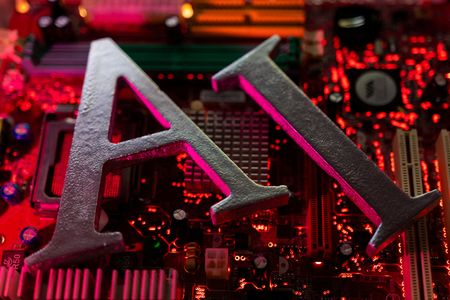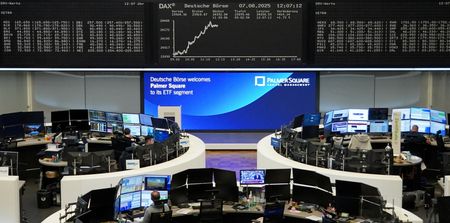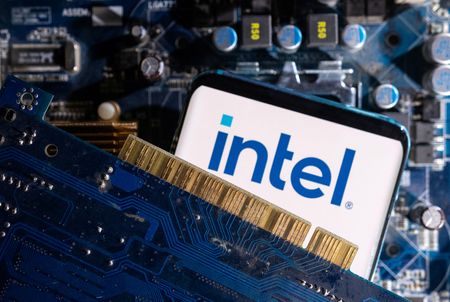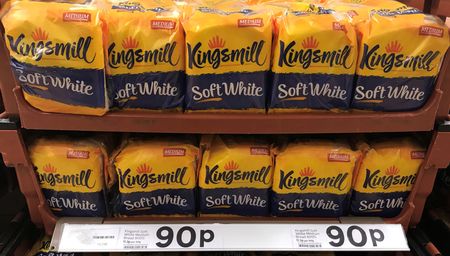By Lucy Raitano
LONDON (Reuters) -A rout in shares of European companies embracing artificial intelligence deepened this week, as powerful new AI models raise questions about whether sectors from software to data analytics could find themselves overtaken by the technology.
European software stocks, including Germany’s SAP and France’s Dassault Systemes, tumbled on Tuesday as worries that AI will disrupt the software sector spread through the market. That followed a downgrade to U.S. rival Adobe on Monday by broker Melius Research.
Since mid-July, shares in markets and data group LSEG, UK software firm Sage, and French IT consulting group Capgemini have dropped 14.4%, 10.8% and 12.3% respectively.
Such companies – dubbed AI adopters by analysts – are investing heavily in the technology to beef up their products and services. Amid a dearth of European AI companies and suppliers, their shares had benefitted as investors in the region sought a way to tap the AI boom powering U.S. markets.
But the release of ever more powerful AI tools appears to have prompted a rethink among some market players.
Last week, OpenAI launched its GPT-5 model, the latest iteration of the AI technology that has helped transform global business and culture since ChatGPT arrived in late 2022.
Kunal Kothari, a fund manager at Aviva Investors, also pointed to the July 15 release of Anthropic’s Claude for Financial Services.
“The app that came out has now challenged an investment case around London Stock Exchange (LSEG), around the provision of financial data,” he said.
“We’re at the stage now with every iteration of GPT or Claude that comes out … it’s multiples more capable than the previous generation. The market’s thinking: ‘oh, wait, that challenges this business model’.”
The drop in European adopter stocks contrasts with broader market gains. Since mid-July, London’s FTSE 100 is up 2.5% and Europe’s STOXX 600 up 0.6%, while U.S. indexes have scaled record highs, largely powered by tech stocks.
Exacerbating matters is the fact that many European adopter stocks trade on high multiples, making them vulnerable to any potential negative news, according to Bernie Ahkong, Chief Investment Officer at hedge fund UBS O’Connor.
The STOXX 600 trades at an average price-to-earnings multiple of 17 times, while SAP – whose shares are down 7.2% since mid-July after posting their biggest daily drop since late 2020 on Tuesday – trades at around 45 times.
WILL AI ‘EAT SOFTWARE’?
Although many AI adopter stocks are struggling, some investors say markets will eventually take a more systematic approach, picking out potential winners and losers.
“At the moment, it feels like the market’s just shooting first and putting them all in a ‘challenged basket’,” said Aviva’s Kothari, referring to the decline in UK AI adopters.
The hype around new AI models has led to the resurfacing of 2017 comments from Jensen Huang, the CEO of AI chipmaking behemoth Nvidia, that “AI is going to eat software”.
“We don’t disagree, but we believe some delineation is warranted here, as not all software companies are equally exposed,” said Steve Wreford, portfolio manager on the global thematic equity team at Lazard Asset Management.
He said those with software deeply embedded into client company workflows, or with hard-to-replicate proprietary data, still had strong competitive advantages.
Paddy Flood, portfolio manager and global sector specialist, technology, at Schroders, said it was important to distinguish between different types of software.
“Enterprise-grade applications are less exposed, given their mission-critical nature, the complexity involved in replacing them, and the value of a trusted vendor ensuring ongoing service,” he said.
Aviva’s Kothari also flagged the benefits of having software deeply embedded with customers, citing UK credit data firm Experian as an example.
“It has lots of data unique to it, but it’s also hugely embedded in the workflows of financial institutions. They want to make a loan, they need Experian,” he said, also highlighting Britain’s Sage.
He holds both stocks, along with LSEG, but cautioned that proprietary data alone may no longer be enough to protect businesses.
“I just don’t think data is a big enough moat anymore,” he said.
The selloff in AI adopter stocks could be an opportunity for investors to pick the winners, said UBS O’Connor’s Ahkong.
“Some of the affected names will actually be able to use AI as an opportunity and tailwind for earnings, but need to prove that from here and that will take time,” Ahkong said.
But how much time the companies have is unclear. Some investors were already warning earlier this year that the clock was ticking for big spenders on AI to show returns.
(Reporting by Lucy Raitano. Editing by Amanda Cooper and Mark Potter)











